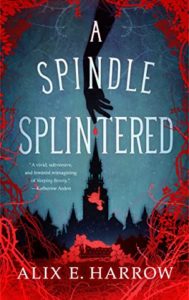
Alix E. Harrow has become one of the more notable names in fantasy over the last several years, riding a tendency to tug at heartstrings and a prose style that’s simultaneously beautiful and easy-to-read to five Hugo nominations (one win) across three separate categories since 2019. Best Novella finalist A Spindle Splintered was my second time dipping into one of her works that dipped into the five-digit word count, but I’d already read enough of hers to be pretty confident I’d like it. The big question was how much.
A Spindle Splintered is described by the author as Into the Spider-Verse applied to Sleeping Beauty, and that’s about right. The main character is a flower-named Ohioan with a terminal illness all-but-guaranteed to kill her by the age of 21. So it may not be an enormous shock that she becomes obsessed with the Sleeping Beauty tale, leading her to a Folklore degree and a best friend who sources an old-fashioned spinning wheel for her birthday party. But it is an enormous shock (to the lead, not the reader) when she gets sucked into a multiverse of variations on the Sleeping Beauty tale and finds herself in the position to help another iteration stave off her fate.
As a fractured fairy tale, A Spindle Splintered is solid, but not boundary-pushing. We’ve seen plenty of feminist spins on classic tales, and we’ve seen multiverses with endless iterations of a story. Putting them together works well enough, but there’s not much here that will drop your jaw. So for anyone who picked up the novella with some idea of what they were getting into, enjoyment is bound to come down to the execution.
And because it’s a novella, that execution isn’t going to include deep character dives into myriad Beauty iterations. We have our lead, whose entire life revolves around her mortality, and we have the alternate Beauty she’s trying to help, and everyone else is a fairly bare-bones sketch—well, every other multiverse character is a sketch; the best friend from back in Ohio gets as much character work as anyone else in the story.
So for me, the novella turns on narrative voice. I find this to be one of Harrow’s biggest strengths as a writer, and I’m almost always able to slip into the lead’s mind even without chapters upon chapters of deep dives into their psyche. A Spindle Splintered was no exception, and the immediately relatable protagonist–jaded with the world’s injustice and with its pity, but quick with a quip and a full arsenal of pop culture references–helped thread the needle perfectly between dark themes and a light tone. As a parent of a girl still very much in the princess and fairy phase, the lead’s remarks about growing out of belief in princesses and fairy tales had me choked up, but even despite a number of genuinely moving passages the story as a whole stayed pretty light and fun. That’s a difficult balance to strike, and it made for a read that was extremely engaging in the moment, even if it didn’t necessarily have the ambition to be one of those you remember years down the line.
Recommended if you like: snarky first-person narrators, feminist fairy tale retellings.
Can I use it for Bingo? It’s a Book Club book with a Cool Weapon by an Author Who Uses Initials.
Overall rating: 17 of Tar Vol’s 20. Five stars on Goodreads.
